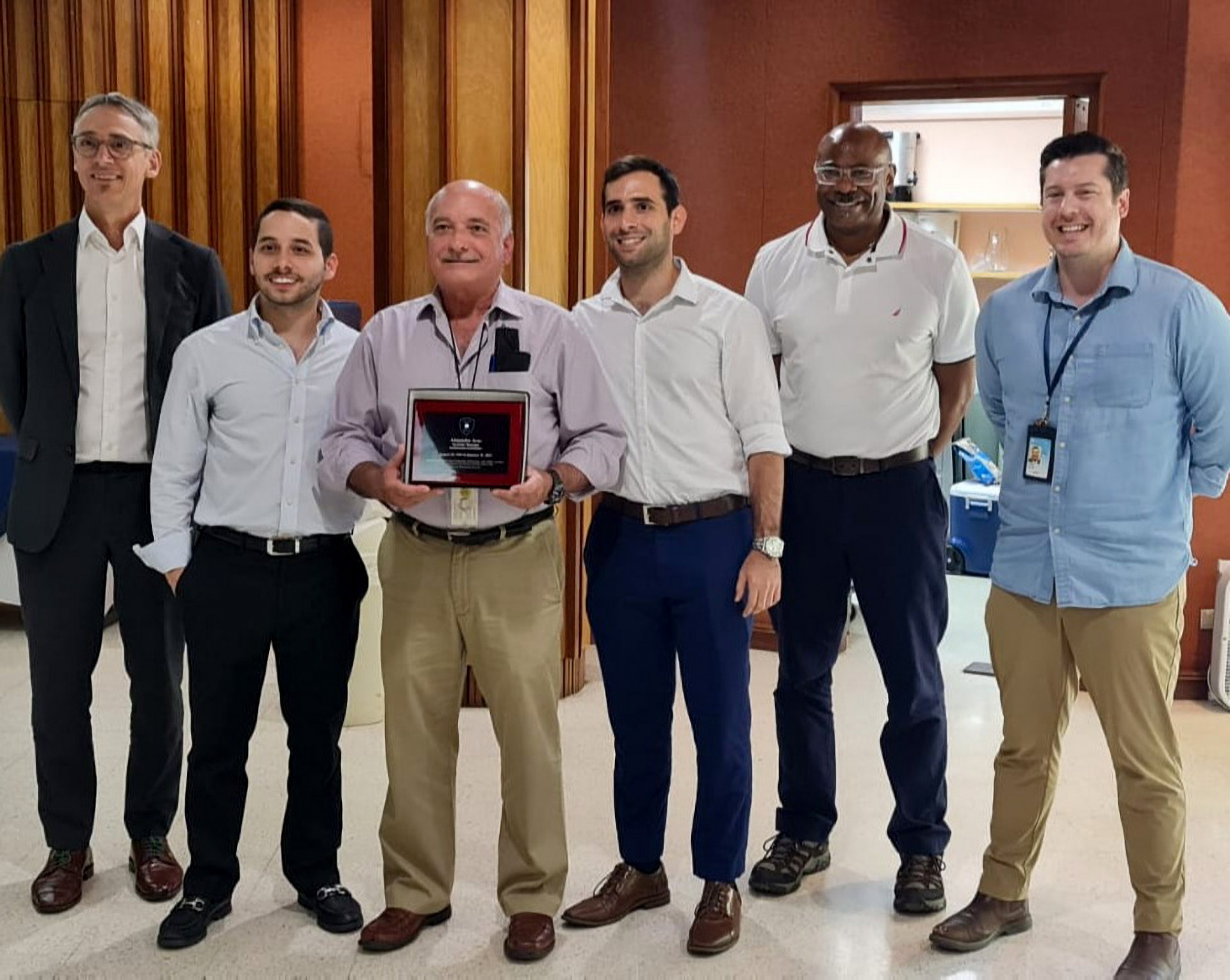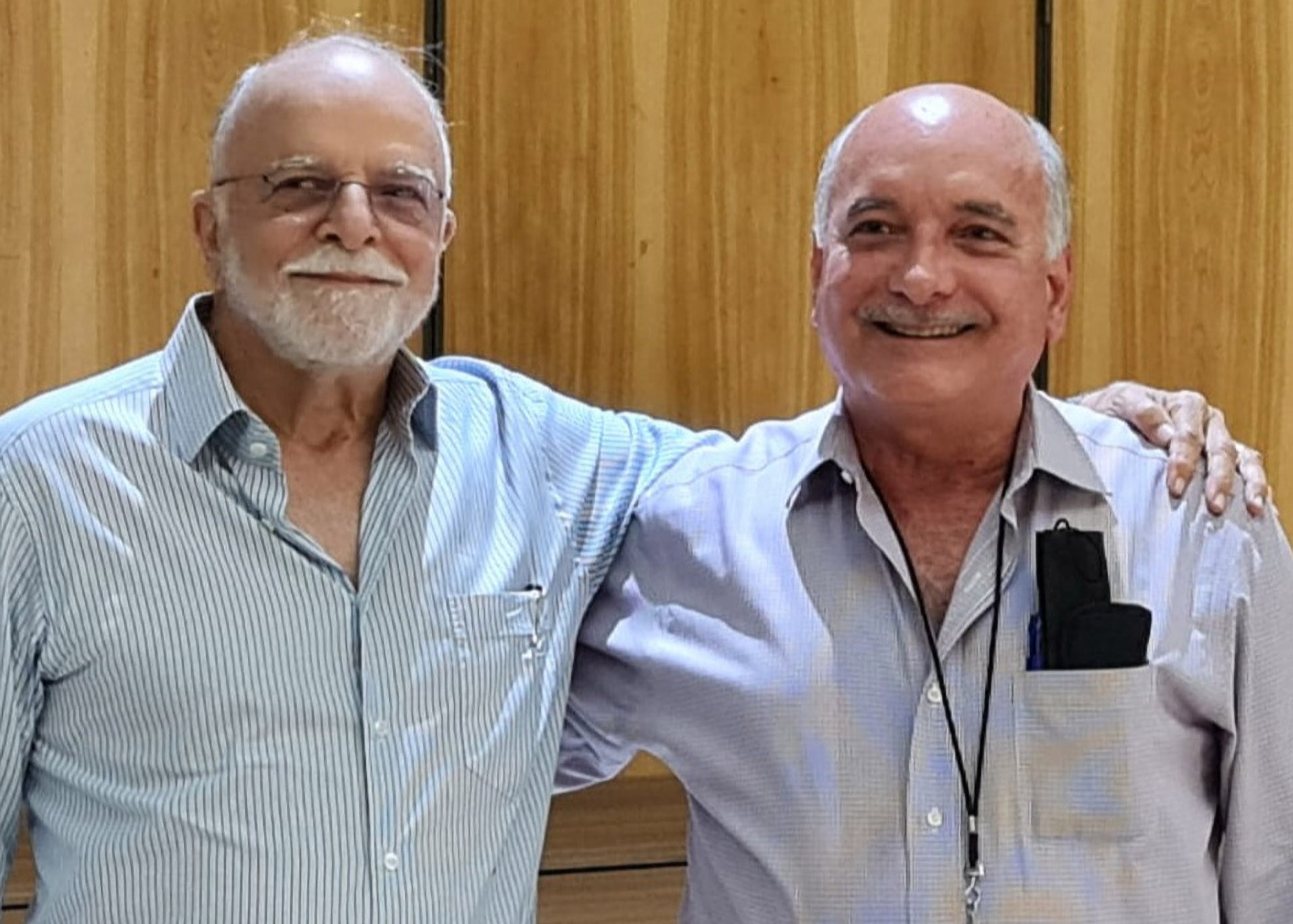Guardian
Alejandro Arze, STRI Director of
Protection and Security, Retires
Byline: Beth King
It takes a very special personality to ensure people’s safety, especially when they work in tropical jungles and reefs at sites that span the Republic of Panamá.
Several months before the US invasion of Panama in 1989, Alejandro Arze joined STRI as the first Director of Protection and Security. At a goodbye celebration for Sr. Arze at the Tupper Center, former STRI Director Ira Rubinoff told a couple of stories about what happened when the U.S. invaded.
“Arze, Carlos Tejada and I were on the radio with Washington, as was when we realized that all three of us were looking up at US Blackhawk helicopters. Apparently, Manuel Noriega was using the same radio frequency we were using, and they traced it to us by mistake.”
Julia Areas, Administrative and Technical Assistant; Carlos Buitrago, Security Assistant; Javier Garibaldi, Security Leader; Ruben Gall, Physical Security Technician
Credit: Beth King
“And later, I asked him if he had heard anything from our marine field station in the Guna Indigenous area of San Blas along the Caribbean coast, and he said that he hadn’t, but would find out. Everything was ok at the time, but not long after he checked, a couple people were detained by Panamanian defense forces.”
Quite a trial by fire for a new employee. So how did Sr. Arze come to be in this situation? After studying geology at the Universidad Federal de Minas Gerais in Brazil he received a master’s degree in geotechnical engineering from the University of Illinois. And before joining STRI 33 years ago, he worked for Shell Oil in industrial security.
Overseeing all STRI security and protection operations kept him up at night. Though Panama is a relatively safe place to work, calls come in to STRI’s control center from researchers involved in traffic or field accidents, students and staff who have lost wallets or passports at a bar or in a taxi, folks at STRI facilities asking for logistical support in the event of health emergencies—from severe heat exhaustion to scorpion stings—and scientists who needed to be evacuated from remote areas because of unforeseen circumstances caused by storms, crime, or political situations. Sr. Arze has seen it all and has significantly strengthened STRI’s relationships with law enforcement agencies: the National Security Council, the National Police, the Judicial Police, the Presidential Police, and Panama Canal Security in Panama; and the US Embassy, the Regional Security Office, the DEA, the US Navy and the FBI.
Joshua Tewksbury, STRI Director; Alejandro Arze Jr., Alejandro Arze Sr., Sebastian Arze, Mike Wallace, Dylan Garon
Credit: Beth King
“I would like to emphasize three of the amazingly difficult situations that Sr. Arze handled brilliantly,” wrote Mario Santamaría, Game Warden Supervisor on Barro Colorado Island. “During the invasion he resolved very unique and delicate security problems; later he directly handled an incident when a policeman was shot and killed by a poacher, and he headed the legal and administrative process to allow Barro Colorado Island game wardens to carry firearms.”
“He has done a really good job,” said Rubinoff, “It’s a hard job, but he is unflappable and great in a crisis because he doesn’t get excited and he’s excellent at keeping information confidential. He worked with both the US military and Panamanian forces during the invasion. He coordinated with local police to protect important archaeology sites. He had to deal with some nasty cases of poaching, but he kept Barro Colorado Island safe, as well as the canopy cranes and our Fortuna site in Chiriquí. I never had to worry about anything because he was on it. His blood pressure may have gone up, but mine never did because I knew I could trust him.”
“Sr. Arze is calm even in crises and gets along with everyone,” said Julia Areas, administrative assistant in the Office of Protection and Security, who personally receives the roughly 1,200 students and scientists who visit STRI each year when they check in to get an ID. “People come from all over the world—places where the rules of conduct are different. We work hard to make STRI facilities feel safe for all our visitors.”
By the year 2000, STRI’s first electronic surveillance system was in place, and technology for facilities security has radically improved. However, STRI also expanded our research platform to include the Bocas del Toro Research Station, which Sr. Arze visits regularly to evaluate security aspects of an area where increased tourism led to increased crime. And Coibita Island in Coiba National Park—STRI’s most remote field site—can only be reached by boat and lacks reliable phone and internet connections.
Caption: Ira Rubinoff, Alejandro Arze
Credit: Beth King
Nestled in lowland forest near the Caribbean terminus of the Panama Canal, the San Lorenzo canopy crane is close to the impoverished city of Colón. Researchers also frequently travel to Panama’s Darien province near the Colombian border, last year the point of entry for almost 250 thousand refugees from other parts of Latin America and the world. OPS works closely with SENAFRONT (Panama’s border police) and the Ecological Police, a branch of the National Police, to accompany researchers when appropriate. Security officers also personally escort VIP visitors to STRI facilities across Panama. International interests in Panama could be targeted by terrorists, so guards must be vigilant beyond protecting STRI visitors and staff from everyday crime.
Rather than responding to the STRI director, Sr. Arze responded directly to the Smithsonian’s Office of Protection and Security (OPS) in Washington, DC. OPS leadership was in Panama to oversee transitions relating to Alejandro’s retirement.
Mark Wallace, Director of Smithsonian OPS, has only been on the job for a year, but he immediately noticed Alejandro’s strength: he treats the members of his team very well and creates a level of trust and friendship that makes it possible to keep STRI secure in a way that’s not obvious to visitors.
Park ranger house opening celebration, Barro Colorado Island, 2019 Top row: Carlos Buitrago, Fernando Caballero, Basilio Mela, Mario Santamaría, Didimo Urreña, Andres Ramos, Rafael Butrón, Enrique Marciaga. Bottom row: Alejandro Arze, Rubén Hernandez, Ricardo Racines, Xenia Saavedra, Julia Areas, Alejandro Garrido
Credit: Jorge Aleman
STRI’s Assistant Security Manager, Fernando Caballero, confirms this: “For 43 years, I have been a member of a musical group called La Tuna de La Salle. Explaining what La Tuna de La Salle is would be a bit tedious and long, but in our group, we always say that more than musicians (because we don’t know much about music), we are a group of friends who use music to share good times. I think that in the same way, STRI employees are united by something just as intangible as music, the love for nature and the knowledge that is produced at STRI.”
Dylan Garon, OPS deputy director, said that every time he visits Panama, something big happens. The first time he came, he found out that his wife would have their first child, the second time, their second and the third time, that he was being promoted to his current position. He is sure that the transition to a new director of STRI OPS will go smoothly under Sr. Arze’s guidance, especially since Alejandro plans to continue to consult for STRI and for the US Embassy after leaving his full-time job.
Alejandro Arze on Barro Colorado Island
Credit: Jorge Aleman
“He will have time to explore his passion for Panamanian history and archaeology,” said Linette Dutari, Associate Director for Communications and Public Programs, “One of his ancestors is buried in the Cathedral and he always asks Tomás (Mendizabal… STRI research associate and Linette’s husband) to tell him stories about the past.”
“Alejandro has always been a great friend and collaborator,” said Xenia Saavedra, Associate Director for Science Administration, “We’ve always joked about sharing the feeling, “I’m on Jupiter.” It’s hard to remember all the people, names, faces and situations…Sometimes we think we’re getting memory loss, but nooo…, as time goes by it has become evident that it’s just a result of the everyday deluge of activity at STRI. Alejandro, we wish you the best in this new stage of life. It will be different: you will be able to do what you feel like doing when you feel like doing it. Enjoy your well-deserved retirement and celebrate with great pomp and circumstance.”





